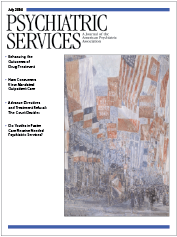Family Therapy as an Alternative to Medication: An Appraisal of Pharmland
The editors of this book—David V. Keith, M.D., a psychiatrist, and Phoebe S. Prosky, M.S.W., a social worker—are highly experienced practitioners of family therapy. In their introduction, they state that they are "developing this book in an attempt to awaken broader awareness of the vision of symptoms-oriented psychotherapy in hopes of keeping it from being disappeared by the strong forces of the medical profession and the pharmaceutical industry."
Psychotherapies of all kinds, the authors argue, are filling a significantly diminished role in the mental health field because of the aggressive promotion of psychopharmacology. That promotion emanates from a number of sources. Prosky and Keith see this phenomenon as harmful to patients who are led to use medication to suppress symptoms such as anxiety and depression, which are often a result of interpersonal or intrapersonal conflicts, which should be resolved by psychotherapeutic means; when psychotherapy is used successfully, the symptoms are resolved rather than suppressed. The title of the book—Family Therapy as an Alternative to Medication: An Appraisal of Pharmland—is to be taken seriously. The authors see "family psychotherapy as (often) a (superior) alternative to medication." The book's many contributors explore all aspects of the problem in various chapters of the book, which deal separately with theoretical formulations, political issues ("the mechanisms behind the accelerating growth of pharmacological practices"), the problem from the viewpoints of clients, and clinical illustrations ("systems-based practices or alternatives to the uses of medication").
It is important to note that the book's contributors are not hostile to medication per se; nor do they deny its usefulness. They argue instead against the rapidly growing use of a purely medical approach to resolving multifaceted, social, psychological, interpersonal problems that patients present. Family Therapy as an Alternative to Medication should be of interest to anyone in the health field.
Dr. Vogel is associate professor of psychiatry at UMass Memorial Health Care, Inc., in Worcester, Massachusetts.



